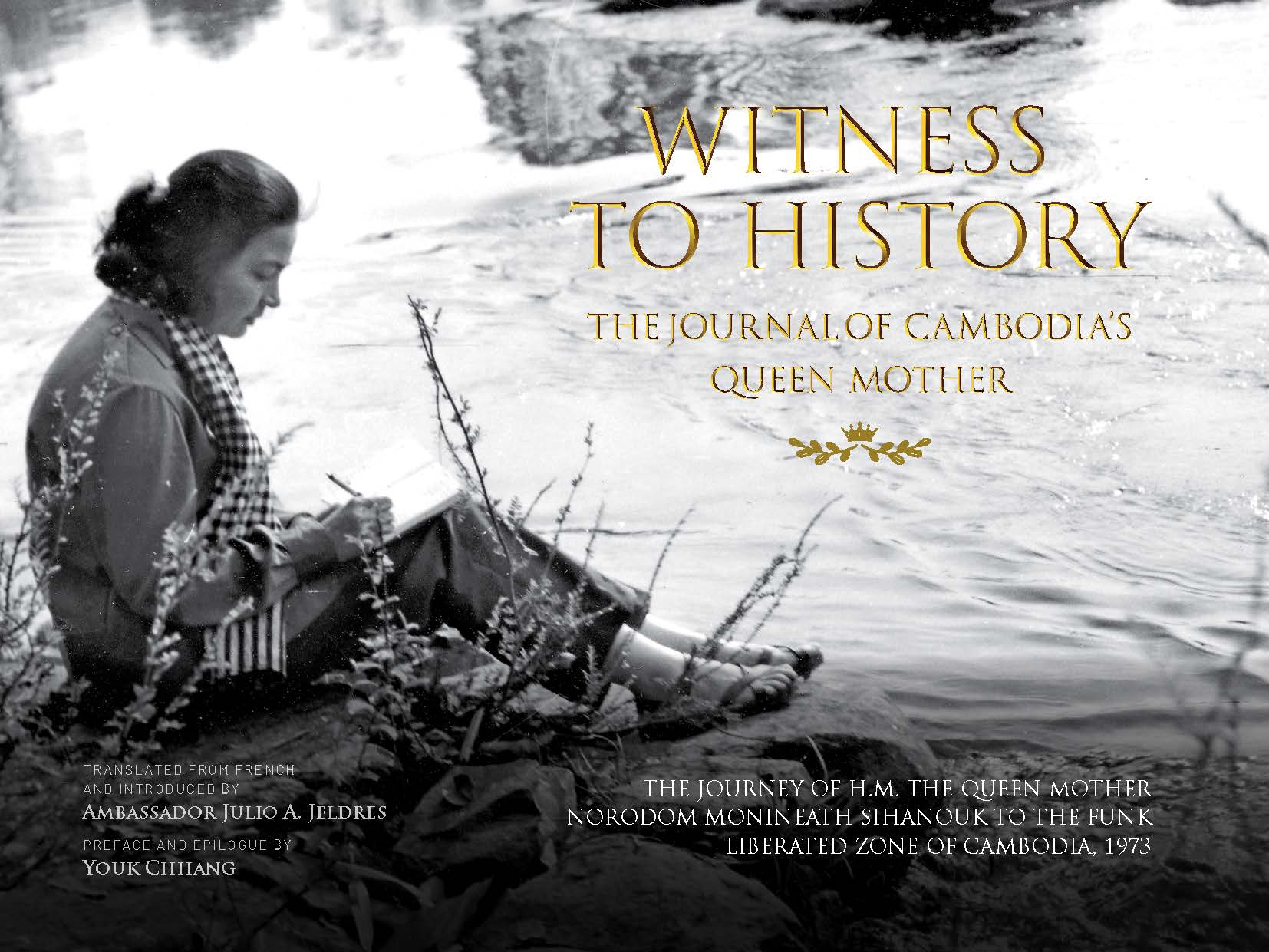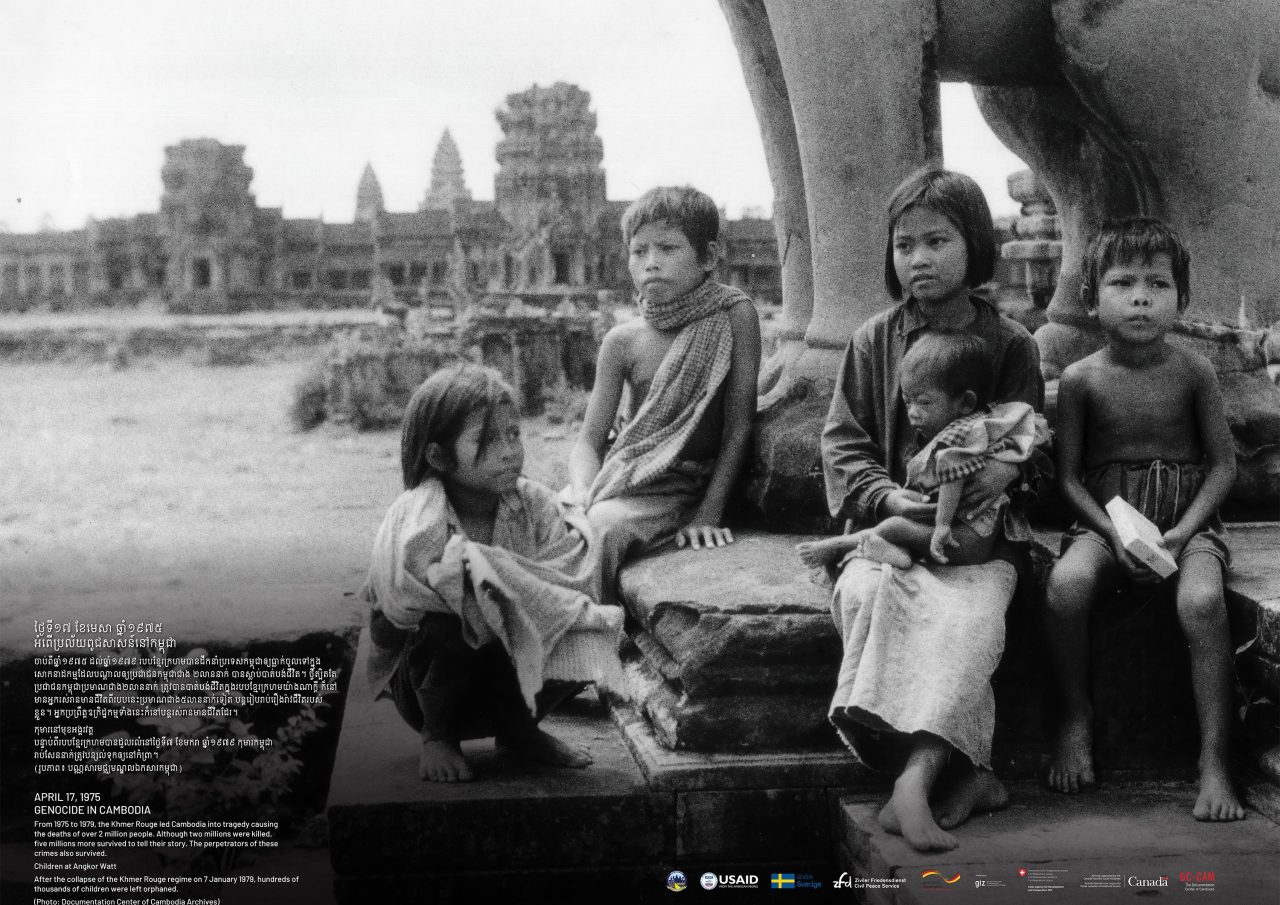 Pol Pot with senior representatives of the People’s Republic of China (PRC): Phnom Penh, November 4, 1978. (Center, right): Pol Pot, Prime Minister and Secretary of the Communist Party of Kampuchea (CPK) with Wang Dong Xing, Vice Chairman of the Central Committee of the Chinese Communist Party (CCP). (Behind Wang Dong Xing): Khieu Samphan, President of State’s Presidium of Democratic Kampuchea. (First from left): Hu Yao Bang, General Secretary of the Central Committee of CCP. (Second from left): Nuon Chea, President of People’s Representative Assembly and Deputy Secretary of the CPK. Note: Ieng Sary, Foreign Minister of Democratic Kampuchea and his wife, Ieng Thirith, Minister of Health and Social Affairs were also present at this event. On Friday, 16 November 2018, the Extraordinary Chambers in the Courts of Cambodia (ECCC) (also known as “the Khmer Rouge Tribunal”) convicted Nuon Chea and Khieu Samphan of genocide, crimes against humanity and grave breaches of the Geneva Conventions of 1949. The crimes were committed at various locations throughout Cambodia during the Democratic Kampuchea period from 17 April 1975 to 6 January 1979. The ECCC Trial Chamber sentenced Nuon Chea and Khieu Samphan to life imprisonment; however, on August 4, 2019, amidst his appeal, Nuon Chea died in the midst of appealing the Trial Chamber’s judgment and sentence in Case 002/02. On August 13, the Supreme Court Chamber determined that the death of Nuon Chea ended all criminal actions against him and it terminated all proceedings against him in the Supreme Court Chamber. Pol Pot became prime minister of Democratic Kampuchea in 1976 and resigned in 1979. He still remained an active leader of the Khmer Rouge until his death. After 1979, he lived in exile, mainly in Thailand, until his death in Anlong Veng district, Oddar Meanchey province, on 15 April 1998. His body was cremated on 17 April 1998. Source: Documentation Center of Cambodia Archives
Pol Pot with senior representatives of the People’s Republic of China (PRC): Phnom Penh, November 4, 1978. (Center, right): Pol Pot, Prime Minister and Secretary of the Communist Party of Kampuchea (CPK) with Wang Dong Xing, Vice Chairman of the Central Committee of the Chinese Communist Party (CCP). (Behind Wang Dong Xing): Khieu Samphan, President of State’s Presidium of Democratic Kampuchea. (First from left): Hu Yao Bang, General Secretary of the Central Committee of CCP. (Second from left): Nuon Chea, President of People’s Representative Assembly and Deputy Secretary of the CPK. Note: Ieng Sary, Foreign Minister of Democratic Kampuchea and his wife, Ieng Thirith, Minister of Health and Social Affairs were also present at this event. On Friday, 16 November 2018, the Extraordinary Chambers in the Courts of Cambodia (ECCC) (also known as “the Khmer Rouge Tribunal”) convicted Nuon Chea and Khieu Samphan of genocide, crimes against humanity and grave breaches of the Geneva Conventions of 1949. The crimes were committed at various locations throughout Cambodia during the Democratic Kampuchea period from 17 April 1975 to 6 January 1979. The ECCC Trial Chamber sentenced Nuon Chea and Khieu Samphan to life imprisonment; however, on August 4, 2019, amidst his appeal, Nuon Chea died in the midst of appealing the Trial Chamber’s judgment and sentence in Case 002/02. On August 13, the Supreme Court Chamber determined that the death of Nuon Chea ended all criminal actions against him and it terminated all proceedings against him in the Supreme Court Chamber. Pol Pot became prime minister of Democratic Kampuchea in 1976 and resigned in 1979. He still remained an active leader of the Khmer Rouge until his death. After 1979, he lived in exile, mainly in Thailand, until his death in Anlong Veng district, Oddar Meanchey province, on 15 April 1998. His body was cremated on 17 April 1998. Source: Documentation Center of Cambodia Archives Pol Pot and senior representatives of the People’s Republic of China: Phnom Penh, November 4, 1978. Cambodian female comrades were standing in line with Chinese and Democratic Kampuchea flags in hand, waving to welcome the arrival of the senior Chinese delegation’s visit to Cambodia in 1978. (Center, front) Pol Pot, Prime Minister and Secretary of the CPK with Wang Dong Xing, Deputy Head of the Central Committee for the CCP. Source: Documentation Center of Cambodia Archives
Pol Pot and senior representatives of the People’s Republic of China: Phnom Penh, November 4, 1978. Cambodian female comrades were standing in line with Chinese and Democratic Kampuchea flags in hand, waving to welcome the arrival of the senior Chinese delegation’s visit to Cambodia in 1978. (Center, front) Pol Pot, Prime Minister and Secretary of the CPK with Wang Dong Xing, Deputy Head of the Central Committee for the CCP. Source: Documentation Center of Cambodia Archives Pol Pot and senior representatives of the People’s Republic of China: Phnom Penh, November 4, 1978. (Center, right): Pol Pot, Prime Minister and Secretary of the CPK with Wang Dong Xing, Deputy Head of the Central Committee of the CCP. (Behind Pol Pot): Khieu Samphan, President of State’s Presidium of Democratic Kampuchea, and Nuon Chea, President of People’s Representative Assembly and Deputy Secretary of the CPK. Source: Documentation Center of Cambodia Archives
Pol Pot and senior representatives of the People’s Republic of China: Phnom Penh, November 4, 1978. (Center, right): Pol Pot, Prime Minister and Secretary of the CPK with Wang Dong Xing, Deputy Head of the Central Committee of the CCP. (Behind Pol Pot): Khieu Samphan, President of State’s Presidium of Democratic Kampuchea, and Nuon Chea, President of People’s Representative Assembly and Deputy Secretary of the CPK. Source: Documentation Center of Cambodia Archives Pol Pot and senior representatives of the People’s Republic of China: Phnom Penh, November 4, 1978. (Center, right): Pol Pot, Prime Minister and Secretary of the CPK with Wang Dong Xing, Deputy Head of the Central Committee of the CCP. Source: Documentation Center of Cambodia Archives
Pol Pot and senior representatives of the People’s Republic of China: Phnom Penh, November 4, 1978. (Center, right): Pol Pot, Prime Minister and Secretary of the CPK with Wang Dong Xing, Deputy Head of the Central Committee of the CCP. Source: Documentation Center of Cambodia Archives (Left to right) Pol Pot, Prime Minister and Secretary of the CPK and Sun Hao, Ambassador of the People’s Republic of China to Democratic Kampuchea in 1978. Source: Documentation Center of Cambodia Archives
(Left to right) Pol Pot, Prime Minister and Secretary of the CPK and Sun Hao, Ambassador of the People’s Republic of China to Democratic Kampuchea in 1978. Source: Documentation Center of Cambodia Archives (Left to right) Sun Hao, Ambassador of the People’s Republic of China to Democratic Kampuchea; Han Nian Long, Vice Foreign Minister of the People’s Republic of China; Hu Yao-Bang, Secretary General of the CCP; (unidentified); Ieng Sary, Deputy Prime Minister and Minister of Foreign Affairs; Wang Dong Xing, Deputy Head of the Central Committee of the CCP; (unidentified); Shen Jian, Deputy Chief of the International Liaison Department of the CCP in 1978. Source: Documentation Center of Cambodia Archives
(Left to right) Sun Hao, Ambassador of the People’s Republic of China to Democratic Kampuchea; Han Nian Long, Vice Foreign Minister of the People’s Republic of China; Hu Yao-Bang, Secretary General of the CCP; (unidentified); Ieng Sary, Deputy Prime Minister and Minister of Foreign Affairs; Wang Dong Xing, Deputy Head of the Central Committee of the CCP; (unidentified); Shen Jian, Deputy Chief of the International Liaison Department of the CCP in 1978. Source: Documentation Center of Cambodia Archives Ieng Sary (center, in black), Foreign Minister of Democratic Kampuchea and Ieng Thirith (left), Minister of Health and Social Affairs with a visiting delegation of senior officials of the People’s Republic of China, November 5, 1978. Source: Documentation Center of Cambodia Archives
Ieng Sary (center, in black), Foreign Minister of Democratic Kampuchea and Ieng Thirith (left), Minister of Health and Social Affairs with a visiting delegation of senior officials of the People’s Republic of China, November 5, 1978. Source: Documentation Center of Cambodia Archives
About The Documentation Center of Cambodia
The Documentation Center of Cambodia (DC-Cam) was founded by Yale University and constituted in 1995 after the U.S. Congress passed the Cambodian Genocide Justice Act in April 1994, which was signed into law by President Clinton. The Royal Government of Cambodia also formally supported DC-Cam. DC-Cam has received numerous accolades and awards for its work in support of memory and justice for victims of the Cambodian genocide. In 2017 alone, DC-Cam was the honored recipients of the Judith Lee Stronach Human Rights Award from the Center for Justice and Accountability, and his Majesty King Norodom Sihamoni made Youk Chhang a Commander of the Royal Order of Cambodia in recognition of Chhang’s distinguished services to the Kingdom of Cambodia. In 2018, DC-Cam also was a winner of the Ramon Magsaysay Awards, which is regarded as ‘Asia’s Nobel’ prize, for preserving historical memory for healing and justice.

Marked annually on March 8, International Women’s Day is one of the most important days of the year to celebrate women’s achievements, raise awareness about women’s equality and lobby for greater gender parity. Today, we honor the Queen Mother for her tireless work on behalf of all Cambodians. A piece of her life’s story can be found in the book, Witness to History. As the Queen of Cambodia, she witnessed multiple chapters of Cambodia’s history, and throughout this history, she has labored both on the national/international stages as well as behind the scenes in support for the Cambodian people. On this day recognizing all women and the pursuit for women’s rights, we want to honor the Queen Mother of Cambodia, a hero to all women and the Cambodian people.
Youk Chhang
នៅថ្ងៃទី៨ ខែមីនាជារៀងរាល់ឆ្នាំ ទិវានារីអន្តរជាតិ គឺជាថ្ងៃដ៏វិសេសវិសាលបំផុតមួយ ដែលត្រូវបានប្រារព្ធឡើងដើម្បីអបអរដល់សមិទ្ធផលរបស់ស្ត្រី បង្កើនការយល់ដឹងអំពីសមភាពរបស់ស្ត្រី និងជំរុញសមភាពយេនឌ័រឲ្យកាន់តែប្រសើរឡើង។ ថ្ងៃនេះ ខ្ញុំសូមថ្វាយសម្តេចម៉ែនូវព្រះកិត្តិយស ចំពោះការបំពេញព្រះរាជកិច្ចដោយឥតនឿយណាយរបស់ព្រះអង្គ សម្រាប់ប្រជាជនកម្ពុជាទាំងអស់។ ព្រះរាជដំណើរជីវិតមួយផ្នែកនៃព្រះអង្គ ត្រូវបានពិពណ៌នានៅក្នុងសៀវភៅ សាក្សីប្រវត្តិសាស្ត្រ។ ក្នុងព្រះនាមជាព្រះរាជវរមាតាជាតិខ្មែរ ព្រះមហាក្សត្រី គឺជាព្រះរាជសាក្សីនៃជំពូកជាច្រើនរបស់ប្រវត្តិសាស្ត្រប្រទេសកម្ពុជា។ តាមរយៈប្រវត្តិសាស្ត្រនេះ ព្រះអង្គបានបំពេញព្រះរាជកិច្ចទាំងនៅលើឆាកជាតិនិងអន្តរជាតិ ព្រមទាំងព្រះរាជកិច្ចសំខាន់ៗជាច្រើនដែលគេមិនសូវដឹងឮ ដើម្បីទ្រទ្រង់ដល់ប្រជាជនកម្ពុជាទាំងអស់។ ឆ្លៀតឱកាសនៅក្នុងថ្ងៃដែលទទួលស្គាល់ចំពោះតម្លៃ ក៏ដូចជាលើកកម្ពស់សិទ្ធិរបស់ស្ត្រីទាំងអស់ ខ្ញុំសូមថ្វាយព្រះកិត្តិយស សម្តេចព្រះមហាក្សត្រី ព្រះវររាជមាតាជាតិខ្មែរ ដែលជាវីរស្ត្រីមួយព្រះអង្គ នៃស្ត្រីគ្រប់រូបនិងជនរួមជាតិកម្ពុជាទាំងអស់។
ឆាំង យុ


